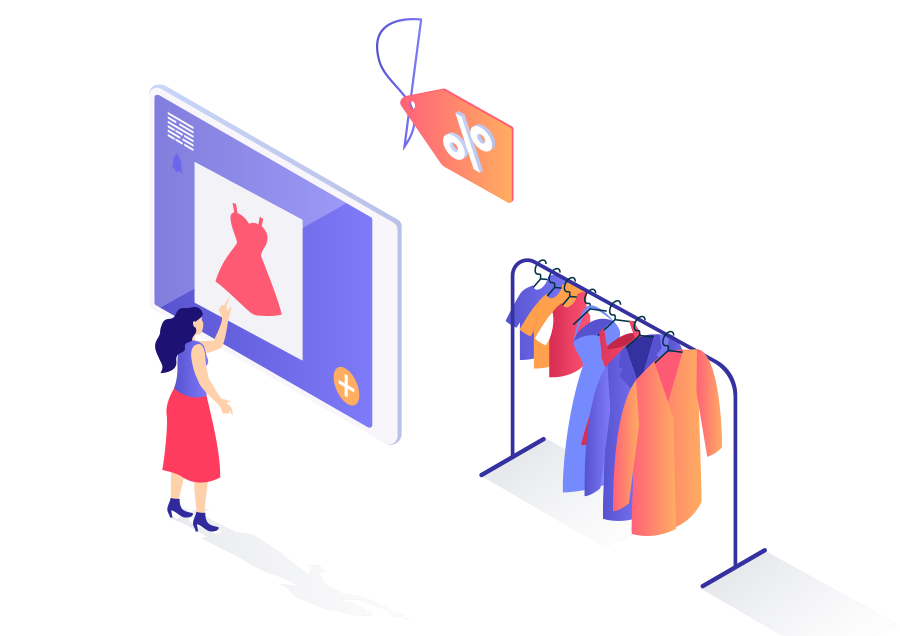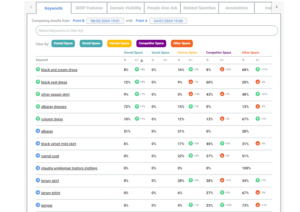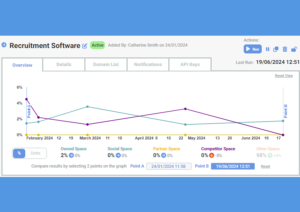How much share of Google page one do women's clothing brands own for their brand keyword?
We took at look at UK women’s clothing brands on SERPsketchto see how each brand name performs on the page one SERP. We ran sketches for:
- H&M
- Zara
- Cos
- Pretty Little Thing
- M&S
- Shein
- Ted Baker
- Missguided
- Mango
- ASOS
We looked each of the brand’s owned domains and their competitors and partners. We categorized domains reselling the brand as Partners. For domains like the App Store, Google Play Store and Wikipedia, we left those as the “Other” domain type, though some brands might decide to count those as owned.
What's notable in the results?
- There are three brands with less than 50% overall share of page one (ASOS 32%, Mango 45%). The reason for this can be attributed to the Knowledge Graph feature which, unlike other brands, ASOS and Mango do not own. Instead Wikipedia owns that space in the SERP.
- Six out of the ten results included a Maps feature with links to the shops nearest to the chosen location (London).
- Only four out of the ten brands had PPC results appearing for their brand keyword, but in all cases they owned 100% of that PPC ad feature.
- Only one of the brands (Pretty Little Thing) had the Tweets feature appear.
- Half of the brands’ SERPs had the People Also Asked questions feature appear. But only one brand, Cos, owned any of the Questions.
Let’s take a look at the SERPsketch visualisations for each brand keyword and the share of space owned by the brand.
H&M
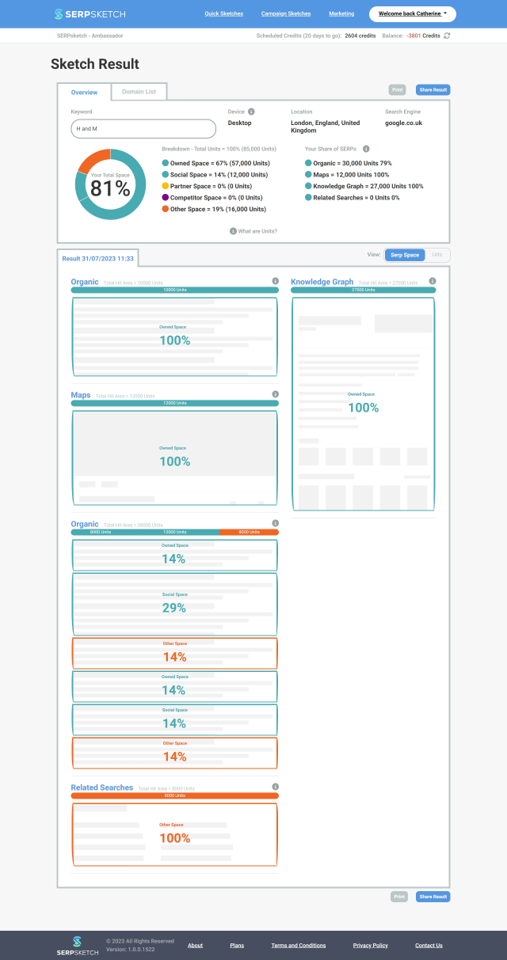
H&M is the top performing brand in this report and owns a whopping 81%of the page one SERP space for its brand term.
The knowledge graph feature appears on the right of the SERP and is owned by them.
The orange spaces within the Organic results are a Wikipedia page about H&M and a link to the Google Play Store H&M app.
Related Searches show as “other” because they lead to more Google pages, not the H&M domain.
Zara
Zara’s own domains have 74%share of the page one SERP for its brand term.
The “Other” spaces within Organic of 14% share are again for a Wikipedia page about Zara, and the Google Play Store Zara app.
Interestingly, Zara’s social media channels take up 35%of the SERP which is quite a lot of share.
Cos
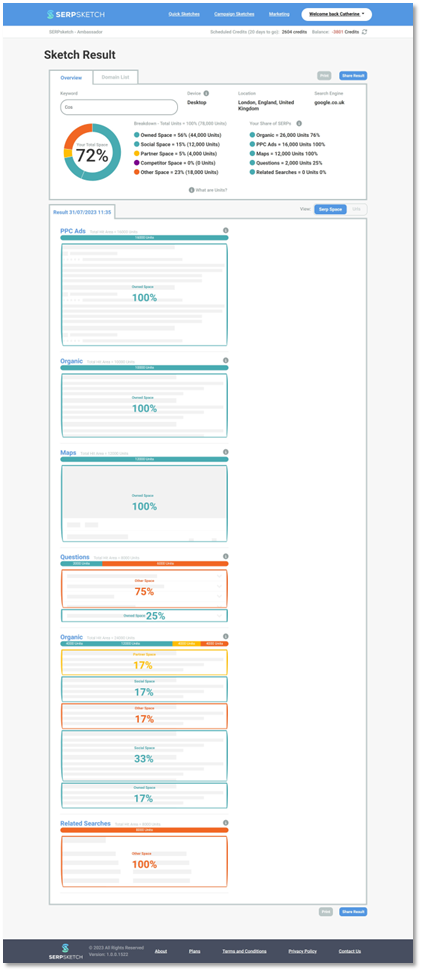
Next, we have Cos whose domains own 72% of the page one SERP.
On this SERP the People Also Asked feature has been triggered and Cos owns one of those questions, “Does Cos have a Canadian website?” It is the only brand in this report that owns a Question result.
We marked up a space as a “partner” (yellow). It’s a corporate page from H&M Group, as Cos is one of their brands.
One result on this page is entirely unrelated to the company Cos –and that’s an organic result for UK Gov’s “Certificate of Sponsorship” (CoS) which takes up 17% of the space (orange).
Pretty Little Thing
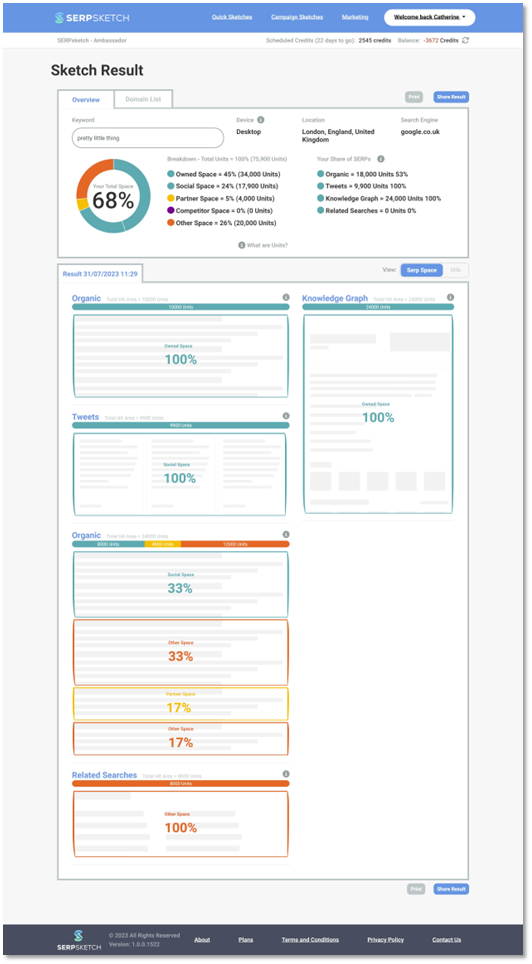
For Pretty Little Thing, they own 68% of the share of page one space.
A quarter of the space is owned by their social domains and this is the only brand where the SERP displayed the Tweets feature.
Like M&S and H&M, PLT owns the large Knowledge Graph space.
Again, Wikipedia appears in organic results, so too do the Google Play Store and the Apple App Store for the Pretty Little Thing apps.
The corporate Boohoo website is marked as a partner (yellow), since Boohoo owns the Pretty Little Thing brand.
M&S
M&S owns 67% of the page one SERP for their brand term.
Like H&M, the Knowledge Graph feature appears and the space is owned by the M&S domain.
Again, the Wikipedia page and the Play Store pages appear in organic results (orange).
This time we’ve also marked up a couple of competitor domains –eBay and Amazon. Though the Amazon result does appear to be selling M&S clothing, it looks to be unofficial.
We’ve also marked up a partner domain. This is Ocado, selling M&S food online.
Shein
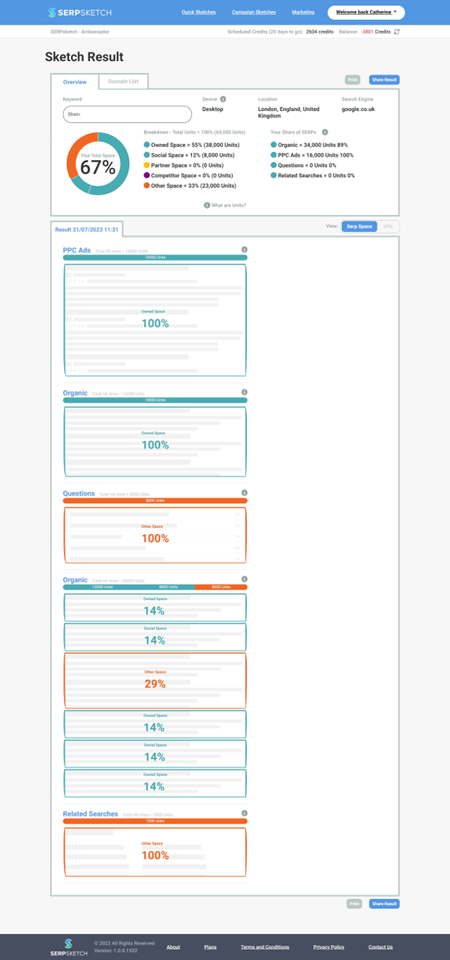
Shein owns 67% of the page one SERP.
This is the first brand term in this report where we see the SERP has PPC ads triggered.
The People Also Asked feature also appears but Shein owns none of those results. A couple of the questions are about the brand’s image and trustworthiness.
Again, the Wikipedia page and the Play Store pages appear in organic results (orange).
Ted Baker

The Ted Baker results page gives us the longest set of features in this report. The Ted Baker domain owns 61% of the page one share for its brand keyword. Only the second brand so far whose keyword triggers PPC ads on the SERP.
Lots of organic features appear scattered between ads, maps and questions.
Domains selling the Ted Baker brand –John Lewis, House of Fraser and ASOS –are marked as partners (yellow).
Missguided
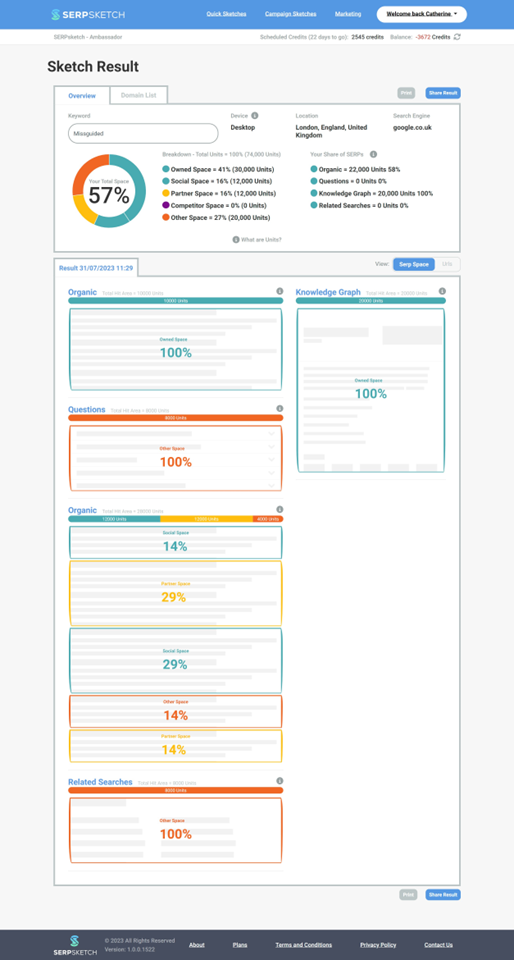
Missguided owns 57%of the page one space.
This is another SERP where the People Also Asked questions feature appears, mostly asking whether Missguided is still in business.
Wikipedia appears, as usual, in the organic results but so too do domains that sell Missguidedclothing. Next, ASOS and House of Fraser are marked as partners.
Mango

Mango owns less than half the space on its brand keyword SERP with 45%of the share on page one.
Though the Knowledge Graph appears, Mango doesn’t own it. Wikipedia does. There’s an opportunity here for Mango to win that space from Wikipedia.
Maps take up 12% of the page one space. Questions appear but, perhaps unsurprisingly, three of them are about the fruit not the brand.
ASOS and Next, who resell Mango clothing, appear as partners (yellow).
ASOS

It’s perhaps surprising that as popular a brand as ASOS has the lowest page one share for its brand term. Our sketch shows it owns just 32%of the share on page one.
The main reason for this is that ASOS does not own the Knowledge Graph feature –Wikipedia does.
Other domains that appear on page one are those we’ve seen before –the Apple App Store and Google Play store links to the ASOS app. Arguably both could be categorized as “owned” domains too.
Why don’t you give SERPsketch a try with your brand name or a selection of your most important keywords? Sign up for a free trial at app.serpsketch.com/FreeTrial

